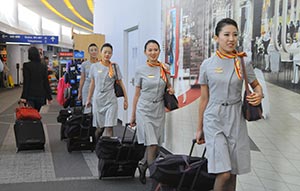

Noting recent success in the industry, the Chinese government has launched a five-year plan to reduce the number of pesticide plants — there are more than 2,000 pesticide makers in China — to create a field of about 20 Chinese agriculture-chemical companies with a strong international presence.
"The big companies in the US aren't encouraging the Chinese to come in," Putsavage said. "But we believe it's inevitable. The Chinese produce the largest part of the product."
The increased presence of Chinese agriculture-chemical producers in the US market would help lower prices for farmers as a result of greater competition.
In turn, China's involvement in the US market will force the Chinese government to pay more attention to environmental concerns, since each chemical factory that makes a product for sale and distribution in the US must register with the US Environmental Protection Agency.
"The interesting aspect is these materials are now made in China," Putsavage said. "It's not like all of a sudden we're going to have materials that are made in China that were being made in Germany or in the US or somewhere else. They're made in China now."
During a business trip to Shanghai in 2010, Putsavage and fellow counsel at Sullivan & Worcester, Leonard Miller, made a presentation to members of the Chinese crop protection industry and gave advice on entering the US market: find a joint venture or some other arrangement with a US company.
"We strongly discouraged Chinese companies from thinking they could come to the US and enter the US market and market directly ... without assistance from people who knew the US market and have been active in the US market," Miller said.
"We believe the winners will be those people who effectively integrate themselves into the US distribution system."
 Models at Ford pavilion at Chengdu Motor Show
Models at Ford pavilion at Chengdu Motor Show
 Brilliant future expected for Chinese cinema: interview
Brilliant future expected for Chinese cinema: interview
 Chang'an launches Eado XT at Chengdu Motor Show
Chang'an launches Eado XT at Chengdu Motor Show
 Hainan Airlines makes maiden flight to Chicago
Hainan Airlines makes maiden flight to Chicago
 Highlights of 2013 Chengdu Motor Show
Highlights of 2013 Chengdu Motor Show
 New Mercedes E-Class China debut at Chengdu Motor Show
New Mercedes E-Class China debut at Chengdu Motor Show
 'Jurassic Park 3D' remains atop Chinese box office
'Jurassic Park 3D' remains atop Chinese box office
 Beauty reveals secrets of fashion consultant
Beauty reveals secrets of fashion consultant